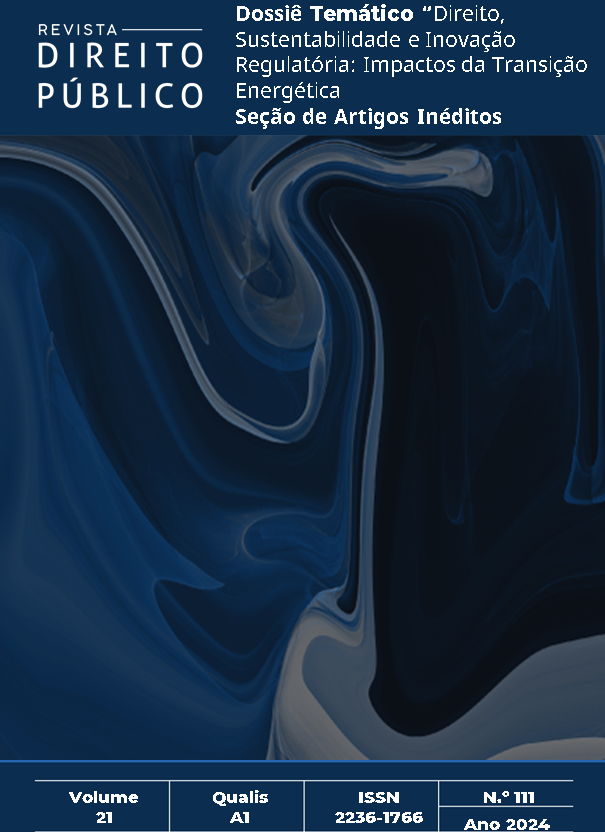O Populismo-Nacionalista e o Backlash a Cortes Internacionais de Direitos Humanos
DOI:
https://doi.org/10.11117/rdp.v21i111.7777Resumo
A ascensão de governos populistas representa uma ameaça às cortes internacionais de direitos humanos? O viés nacionalista é mais ameaçador às cortes que outros tipos de populismo? Partindo do pressuposto que governos populistas colocam em risco as funcionalidades de instituições internacionais, destaca-se o papel do backlash como estratégia de resistência de governos às cortes internacionais de direitos humanos. Com recorte temporal de 1990 até 2020, dois bancos de dados já existentes são combinados e analisados conjuntamente para classificar a presença do populismo nos casos de resistência e backlash às cortes. No que tange à promoção desses backlashes, foi observado que governos populistas e não populistas não se diferenciam em quantidade, mas populistas reagem mais a críticas de mega-política, e não populistas reagem a interferências domésticas. Outro ponto de distinção está no tipo de backlash utilizado; enquanto os não populistas são mais incisivos na saída, os populistas diversificam. Com relação ao populismo-nacionalista, não se constatou maior ameaça às cortes.
PALAVRAS-CHAVE: Populismo; Nacionalismo; Backlash; Cortes Internacionais; Direitos Humanos.
Downloads
Referências
AFRICAN UNION, members back Kenyan plan to leave ICC. The Guardian, Londres, 01 fev. 2016. Disponível em: <https://www.theguardian.com/world/2016/feb/01/african-union-kenyan-plan-leave-international-criminal-court>. Acesso em: 10 fev. 2023.
ALTER, Karen; HAFNER-BURTON, Emilie; HELFER, Laurence. Theorizing the Judicialization of International Relations. International Studies Quarterly, v. 63, n. 3, p. 449–463, 2019. DOI: https://doi.org/10.1093/isq/sqz019
BARNETT, Michael; FINNEMORE, Martha. Rules For The World. International Organizations in Global Politics. Ithaca: Cornell University Press, 2004.
BULL, Hedley. Sociedade Anárquica. São Paulo: Unb-IPRI, 2002.
BURRETT, Tina. Charting Putin’s shifting populism in the Russian media from 2000 to 2020. Politics and Governance, 8 (1), p. 193-205, 2020. DOI: https://doi.org/10.17645/pag.v8i1.2565
CONTESSE, Jorge. Resisting the Inter-American Human Rights System. Yale J. Int'l L., v. 44, p. 179, 2019.
COPELOVITCH, Mark; PEVEHOUSE, Jon. International organizations in a new era of populist nationalism. The Review of International Organizations, v. 14, n. 2, p. 169–186, jun. 2019. DOI: https://doi.org/10.1007/s11558-019-09353-1
COUSO, Javier; HUNEEUS, Alexandra; SIEDER, Rachel. Cultures of legality: judicialization and political activism in Latin America. Cambridge University Press, 2010. DOI: https://doi.org/10.1017/CBO9780511730269
DALY, Tom; WIEBUSCH, Micha. The African Court on Human and Peoples' Rights: Mapping resistance against a young court. International Journal of Law in Context, 14(2), 294-313, 2018. doi:10.1017/S1744552318000083. DOI: https://doi.org/10.1017/S1744552318000083
DONNELLY, Jack. The social construction of international human rights. In: DUNNE, Tim; WHEELER, Nicholas. Human Rights in Global Politics. New York: Cambridge University Press, p. 71–102, 1999. DOI: https://doi.org/10.1017/CBO9781139171298.004
DONNELLY, Jack; WHELAN, Daniel. International Human Rights. Routledge, 2018. DOI: https://doi.org/10.4324/9780429456862
DUNCOMBE, Constance; DUNNE, Tim. After liberal world order. International Affairs, v. 94, n. 1, p. 25–42, 2018. DOI: https://doi.org/10.1093/ia/iix234
DUTERTE TAUNTS, ICC in SONA 2021: I never denied ‘I will kill’ in war vs drugs. Rappler, Pasig, 26 jul. 2021. Disponível em: <https://www.rappler.com/nation/duterte-taunts-international-criminal-court-sona-2021/>. Acesso em 29 mar. 2023.
EVO MORALES, exige que la CIDH vigile también a EEUU o desaparezca. El Economista, Madri, 04 jun. 2012. Disponível em: <https://www.eleconomista.es/flash/noticias/4015783/06/12/Evo-Morales-exige-que-la-CIDH-vigile-tambien-a-EEUU-o-desaparezca.html>. Acesso em: 29 fev. 2023.
FORSYTHE, David. Human rights in international relations. New York: Cambridge University Press, 2012. DOI: https://doi.org/10.1017/CBO9781139059114
FUKUYAMA, Francis. The end of history and the last man. New York: Free Press, 1992.
GOLDSTEIN, Judith; KAHLER; Miles; KEOHANE, Robert; and SLAUGHTER, Anne-Marie. Legalization and World Politics. Cambridge: MIT Press, 2001
GOMES NETO, José; BARBOSA, Luís;PAULA FILHO, Alexandre. O que nos dizem os dados?: Uma introdução à pesquisa jurídica quantitativa. Petrópolis: Editora Vozes, 2023.
HELFER, Laurence; VOETEN, Erik. Walking Back Human Rights in Europe? European Journal of International Law, v. 31, n. 3, p. 797–827, 2020. DOI: https://doi.org/10.1093/ejil/chaa071
HIRSCHL, Ran. The Judicialization of Mega-Politics and the Rise of Political Courts. Annual Review of Political Science, v. 11, n. 1, p. 93–118, 2008. DOI: https://doi.org/10.1146/annurev.polisci.11.053006.183906
HUNEEUS, Alexandra; MADSEN, Mikael. Between universalism and regional law and politics: A comparative history of the American, European, and African human rights systems. International Journal of Constitutional Law, v. 16, n. 1, p. 136–160, 2018. DOI: https://doi.org/10.1093/icon/moy011
HUNEEUS, Alexandra. The Inter-American Court of Human Rights. Oxford: Oxford University Press, 2018. DOI: https://doi.org/10.1093/oso/9780198795582.003.0009
HURRELL, Andrew. On global order: power, values, and the constitution of international society. New York: Oxford University Press, 2007. DOI: https://doi.org/10.1093/acprof:oso/9780199233106.001.0001
IKENBERRY, Gilford. Liberal Internationalism 3.0: America and the Dilemmas of Liberal World Order. Perspectives on Politics, 7(1), 71–87, 2009. DOI: https://doi.org/10.1017/S1537592709090112
IKENBERRY, Gilford. The end of liberal international order? International Affairs, v. 94, n. 1, p. 7–23, 2018. DOI: https://doi.org/10.1093/ia/iix241
KEOHANE, Robert. After Hegemony: Cooperation and Discord in the World Political Economy. Princeton: Princeton University Press, 1984.
KINZELBACH, K. Resisting the power of human rights: The People’s Republic of China. In: RISSE, Thomas; ROPP, Stephen; SIKKINK, Kathryn. The Persistent Power of Human Rights. New York: Cambridge University Press, p. 164–181, 2013. DOI: https://doi.org/10.1017/CBO9781139237161.013
KLIMAN, Daniel M. The West and Global Swing States. The International Spectator, v. 47, n. 3, p. 53–64, 2012. DOI: https://doi.org/10.1080/03932729.2012.700017
KYLE, Jordan; MEYER, Brett. High tide? Populism in power, 1990-2020. Institute for Global Change, 2020. Disponível em: <https://www.institute.global/insights/politics-and-governance/high-tide-populism-power-1990-2020>. Acesso em: 13 dez. 2022.
LUTZ, Ellen; SIKKINK, Kathryn. The Justice Cascade: The Evolution and Impact of Foreign Human Rights Trials in Latin America. Chicago Journal of International Law, Vol. 2: No. 1, Article 3., 2001.
MADSEN, Mikael. The Challenging Authority of the European Court of Human Rights: From Cold War Legal Diplomacy to the Brighton Declaration and Backlash. Law and Contemporary Problems, 27, p.141-178, 2016. DOI: https://doi.org/10.2139/ssrn.2588471
MADSEN, Mikael. Two-level politics and the backlash against international courts: Evidence from the politicisation of the European court of human rights. The British Journal of Politics and International Relations, v. 22, n. 4, p. 728–738, 2020. DOI: https://doi.org/10.1177/1369148120948180
MÄLKSOO, L. Russia’s Constitutional Court Defies the European Court of Human Rights. European Constitutional Law Review, 12(02), 377–395, 2016. doi:10.1017/s1574019616000237 DOI: https://doi.org/10.1017/S1574019616000237
MUDDE, C. Populist Radical Right Parties in Europe. New York: Cambridge University Press, 2007. DOI: https://doi.org/10.1017/CBO9780511492037
MUDDE, C. The Populist Zeitgeist. Government and Opposition, v. 39, n. 4, p. 541–563, 2004. DOI: https://doi.org/10.1111/j.1477-7053.2004.00135.x
MUELLER, Susanne. Kenya and the International Criminal Court (ICC): politics, the election and the law. Journal of Eastern African Studies, 8(1), 25–42, 2014. doi:10.1080/17531055.2013.874142. DOI: https://doi.org/10.1080/17531055.2013.874142
NACIONALIDAD DOMINICANA, y Corte Interamericana de Derechos Humanos. El País, Madri, 19 nov. 2014. Disponível em: <https://elpais.com/internacional/2014/11/18/actualidad/1416347666_585123.html>. Acesso em: 12 fev. 2023.
PERU WITHDRAWS, From International Rights Court. The Washington Post, Washington, D.C., 07 jul. 1999. Disponível em: <https://www.washingtonpost.com/archive/politics/1999/07/08/peru-withdraws-from-international-rights-court/bbd3415f-2a8a-4965-a7ad-2616d214be60/>. Acesso em: 08 jan. 2023.
PHILIPPINES DRUGS, war: Duterte to withdraw from ICC. BBC, Londres, 14 mar. 2018. Disponível em: <https://www.bbc.com/news/world-asia-43397837>. Acesso em: 11 fev. 2023.
PIOVESAN, Flávia. Direitos humanos e justiça internacional: um estudo comparativo dos sistemas regionais europeu, internamericano e africano. São Paulo: Saraiva Educação, 2019.
PIOVESAN, Flávia; IKAWA, Daniela. O Tribunal Penal Internacional e o direito brasileiro. Revista Anistia Política e Justiça de Transição, n. 8, p. 154-189, 2012.
POLISH COURT, finds European human rights convention 'incompatible' with constitution. Euronews. Lion, 10 mar. 2022. Disponível em: <https://www.euronews.com/2022/03/10/polish-court-finds-european-human-rights-convention-incompatible-with-constitution>. Acesso em 05 mar. 2023.
POSNER, Eric. Liberal Internationalism and the Populist Backlash. SSRN Electronic Journal, 2017. DOI: https://doi.org/10.2139/ssrn.2898357
RIBEIRO, Mikelli; CARVALHO NETO, Ernani. The withdraw of Member-states from Human Rights Courts: is the judicialization of mega-politics a necessary condition? Revista de Direito Internacional, v. 18, n. 3, 2022. DOI: https://doi.org/10.5102/rdi.v18i3.7542
RIBEIRO, Mikelli; RAMANZINI, Isabela; SANTOS, Alana. A Corte Interamericana De Direitos Humanos E a judicialização Internacional Da política doméstica. Meridiano 47 - Journal of Global Studies, 21, 2020. https://doi.org/10.20889/M47e21004. DOI: https://doi.org/10.20889/M47e21004
ROMANO, Cesare. The Rule of Prior Exhaustion of Domestic Remedies: Theory and Practice in International Human Rights Procedures. In: BOSCHIERO, Nerina, SCOVAZZI, Tullio, PITEA, Cesare, RAGNI, Chiara. International Courts and the Development of International Law. T.M.C. Asser Press, 2013. https://doi.org/10.1007/978-90-6704-894-1_41 DOI: https://doi.org/10.1007/978-90-6704-894-1_41
RWANDA REJECTS, calls to endorse African rights court. The Citizen, Dar Es Salaam, 19 abr. 2021. Disponível em: <https://www.thecitizen.co.tz/tanzania/news/national/rwanda-rejects-calls-to-endorse-african-rights-court-2561186>. Acesso em: 26 fev. 2023.
SENYONJO, Manisuli. State Withdrawal Notifications from the Rome Statute of the International Criminal Court: South Africa, Burundi and the Gambia. In: AMBOS, Kai. Criminal Law Forum. Dordrecht: Springer Netherlands, p. 63-119, 2018. DOI: https://doi.org/10.1007/s10609-017-9321-z
SHAFFER, Gregory; GINSBURG, Tom. The Empirical Turn in International Legal Scholarship. American Journal of International Law, v. 106, n. 1, p. 1–46, 2012. DOI: https://doi.org/10.5305/amerjintelaw.106.1.0001
SOLEY, Ximena; STEININGER, Silvia. Parting ways or lashing back? Withdrawals, backlash and the Inter-American Court of Human Rights. International Journal of Law in Context, v. 14, n. 2, p. 237–257, 2018. DOI: https://doi.org/10.1017/S1744552318000058
SOUTH AFRICA, to Leave International Court. The New York Times. Nova Iorque, 21 out. 2016. Disponível em: <https://www.nytimes.com/2016/10/22/world/africa/south-africa-international-criminal-court.html>. Acesso em: 08 jan. 2023. DOI: https://doi.org/10.1080/13567888.2016.1276368
STIANSEN, Øyvind; VOETEN, Erik. Backlash and Judicial Restraint: Evidence from the European Court of Human Rights. International Studies Quarterly, v. 64, n. 4, p. 770–784, 7 dez. 2020. https://doi.org/10.1093/isq/sqaa047. DOI: https://doi.org/10.1093/isq/sqaa047
TAKING A, cue from Putin, Duterte threatens to withdraw from the International Criminal Court. The Washington Post, Washington, D.C., 17 nov. 2016. Disponível em: <https://www.washingtonpost.com/news/worldviews/wp/2016/11/17/taking-a-cue-from-putin-duterte-threatens-to-withdraw-from-the-international-criminal-court/>. Acesso em: 10. jan. 2023.
THE ROCKY, relationship between Russia and the European Court of Human Rights. The Washington Post, Washington, D.C., 23 abr. 2014. Disponível em: <https://www.washingtonpost.com/news/monkey-cage/wp/2014/04/23/the-rocky-relationship-between-russia-and-the-european-court-of-human-rights/>. Acesso em: 19 mar. 2023.
TORIES PLAN, to withdraw UK from European convention on human rights. The Guardian, Londres, 03 out. 2014. Disponível em: <https://www.theguardian.com/politics/2014/oct/03/tories-plan-uk-withdrawal-european-convention-on-human-rights>. Acesso em: 03 mar. 2023.
UGANDA'S MUSEVENI, calls on African nations to quit the ICC. Reuters, Londres, 12 dez. 2014. Disponível em: <https://www.reuters.com/article/us-africa-icc-idUSKBN0JQ1DO20141212>. Acesso em: 05 fev. 2023.
UGANDAN PRESIDENT, Yoweri Museveni lashes out at ICC, wants Africa to pull out. The Standard, Nairóbi, 2014. Disponível em: <https://www.standardmedia.co.ke/article/2000144601/ugandan-president-yoweri-museveni-lashes-out-at-icc-wants-africa-to-pull-out>. Acesso em 05 fev. 2023.
VENEZUELA. Ministério do Poder Popular para Assuntos Internacionais da República Bolivariana da Venezuela. Carta ao Secretário Geral das Organização dos Estados Americanos. Caracas, 2012. Disponível em: <https://www.oas.org/DIL/Nota_Rep%C3%BAblica_Bolivariana_Venezuela_to_SG.English.pdf>. Acesso em 02 mar. 2023.
VERBEEK, Bertjan; ZASLOVE, Andrej. Populism and Foreign Policy. Oxford University Press, v. 1, 2017. DOI: https://doi.org/10.1093/oxfordhb/9780198803560.013.15
VILJOEN, Frans. Forging a credible African system of human rights protection by overcoming state resistance and institutional weakness: compliance at a crossroads. In: GROTE, Rainer;ANTONIAZZI, Mariela; PARIS, David. Research Handbook on Compliance in International Human Rights Law. Cheltenham: Edward Elgar Publishing Limited, 2021. DOI: https://doi.org/10.4337/9781788971126.00027
VINJAMURI, Leslie. Human Rights Backlash. In: HOPGOOD, Stephen; SNYDER, Jack; VINJAMURI, Leslie. Human Rights Futures. New York: Cambridge University Press, p. 114–134, 2017. DOI: https://doi.org/10.1017/9781108147767.005
VOETEN, Erik. Populism and Backlashes against International Courts. Perspectives on Politics, v. 18, n. 2, p. 407–422, 2019. DOI: https://doi.org/10.1017/S1537592719000975
VON BORZYSKOWSKI, Inken; VABULAS, Felicity. Hello, goodbye: When do states withdraw from international organizations? The Review of International Organizations, v. 14, n. 2, p. 335–366, 2019. DOI: https://doi.org/10.1007/s11558-019-09352-2
VOSS, Michael. Contesting Sexual Orientation and Gender Identity at the UN Human Rights Council. Human Rights Review, v. 19, n. 1, p. 1–22, 2018. DOI: https://doi.org/10.1007/s12142-017-0483-1
Publicado
Como Citar
Edição
Seção
Licença
Copyright (c) 2024 Direito Público

Este trabalho está licenciado sob uma licença Creative Commons Attribution-NonCommercial 4.0 International License.
O(s)/A(s) autores(as) dos manuscritos submetidos concorda(m) com as regras a seguir:
1) Todos os autores e autoras participaram do trabalho, são responsáveis pelas ideias e conceitos nele emitidos e atestam sua conformidade com os princípios éticos exigidos.
2) Todos os autores e autoras concordam com a forma final do trabalho e em ceder os direitos para publicação nos canais de publicação da Escola de Direito do IDP.
3) Todos os autores e autoras informam que o manuscrito é de sua autoria e assumem a responsabilidade pelo trabalho, declarando que a obra a ser publicada não infringe quaisquer direitos de propriedade intelectual de terceiros.
3.1) Em caso de submissão simultânea, além da reprovação imediata do artigo e comunicação ao(s) respectivo(s) periódico(s), a Revista Direito Público se reserva o direito de não receber novas submissões de todos os autores implicados pelo prazo de 2 (dois) anos, contado a partir da data de ciência do fato.
4) Todos os autores e autoras autoriza(m) a edição de seu trabalho e cede(m) à Escola de Direito do IDP os direitos de autor para reproduzir, editar e publicar ou veicular o citado trabalho em qualquer forma midiática, resguardada a autoria, em particular sob forma digital, em arquivo eletrônico online na Internet, bem como armazená-los em seu repositório de acordo com o desenvolvimento do processo editorial. Esta concessão não terá caráter oneroso para a Escola de Direito do IDP, não havendo remuneração sob qualquer modalidade pela utilização do referido material, tendo este o caráter de colaboração científica.












